#fn aphrodite
Explore tagged Tumblr posts
Text


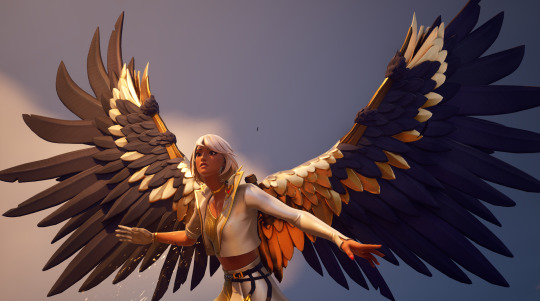





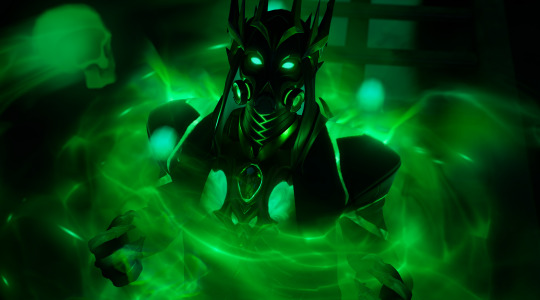
MYTHS & MORTALS
#fortnite#fortography#fortnite skins#fortnite battle royale#virtual photography#fortnite photography#fortnite chapter 5#fortnite chapter 5 season 2#c5s2#fortnite myths and mortals#fortnite myths & mortals#greek mythology#aphrodite#zeus#hades#medusa#korra#cerberus#poseidon#artemis#avatar korra#fn zeus#fn cerberus#fn aphrodite#fn hades#fn artemis#fn poseidon#fn medusa#the legend of korra#avatar the legend of korra
37 notes
·
View notes
Text
Balthus, born Balthasar Klossowski, most famously painted cats and girls. The public narrative surrounding Balthus, a mysterious and somewhat narcissistic figure, is ambiguous. He harbored a curious preoccupation with the adolescent girls who frequently appeared as the subject matter in his paintings. Of them, he painted his model Thérèse Blanchard obsessively, depicting her time and time again. In Balthus’s depictions, Thérèse (as well as other young girls) recline unnaturally in luxurious chaises, against severe backgrounds, and are often accompanied by a grinning cat. Despite Balthus’s masterful technique, his paintings garnered no shortage of criticism, particularly surrounding the suggestive portrayals of adolescents. Balthus’s critics may not be necessarily wrong: his paintings are ethically questionable at best and pedophilic at worst. He is undeniably deserving of such criticism; however, many critics seek to demonize him without seeking to understand Balthus at more than a surface level. Balthus’s paintings are carefully arranged and painted with purpose. Intentionally or not, his careful planning forces the observer into a voyeuristic position. Specifically, Balthus’s inclusion of cats elevates the aesthetic quality of his portraiture by forcing observers to confront the nature of their gaze.
Based on the content of Balthus’s paintings and his work with young models throughout his career, critics have accused Balthus of pedophilia. Many critics tend to leap from his paintings of children to the idea of Balthus’s sexual attraction to those children. Concerns about pedophilia seem to be based on the paintings alone: The models who posed for Balthus have not spoken out against him in that regard, there are no tangible records to indicate any transgressions, and Balthus denied the allegations of pedophelia. With regard to the paintings themselves, critics’ concerns are not unsound; the careful eroticism of Thérèse Blanchard and his other young models are indeed concerning. However, critical analyses of Balthus’s work tend to be overshadowed by debates over his pedophilic tendencies. Although accusations of pedophilia stain the aesthetic accomplishments of Balthus, the greater themes of his paintings must still be evaluated and explored. Without denying any concerns raised by the subject matter of his paintings, the audience can still examine and understand the aesthetic quality of Balthus’s work within the context of the Western artistic tradition.
Preceding Balthus, the tradition of nude women traces back to Hellenic origins. Classical depictions of naked women often involved her sexuality. Yet the most ubiquitous portrayals of a woman, nude, were those of Aphrodite which glorified her position as a goddess.1 149-151.[/fn] Christian tradition introduced the aspect of shame in regards to nudity; upon ingesting the apple, Eve becomes aware of “the spectator.”2 Beginning with Eve, the Western tradition of female nudes became a weapon of subordination. The positioning of the woman as the object and the man as the spectator leverages power to the spectator. The object–spectator relationship within Western tradition creates a hierarchy where “the ‘ideal’ spectator is always assumed to be male and the image of the woman is designed to flatter him.”3 Following that tradition, many female nudes of Western tradition feature a reclining woman, her body contorted to cater to the fantasies of the surveilling men. While the figure portrayed is acutely and ineffably aware of being watched, the integration of the object–spectator relationship into social consciousness means that the spectator may not always recognize his position, taking it for granted. Normalized in media, the gaze of the male voyeur pervades public consciousness, becoming the default lens through which to view art. Any viewer faced with a female nude then assumes the voyeuristic perspective, since reclining nudes are painted (often by men) for men. The artistic tradition is saturated with women tailored to men’s needs and the voyeuristic male gaze. Although Balthus undoubtedly participated in the Western tradition, his paintings also diverge from it. Perhaps unintentionally, Balthus’s pieces subvert tropes of the reclining nude, creating a compelling experience and forcing an uncomfortable awareness of voyeurism. Starting from Balthus’s own art education, he steps away from the conventional nude.
Balthus’s background as self-taught artist factors into eventual defiance of artistic tradition. Apart from a few “informal sketching classes,�� Balthus’s art education came largely from copying frescoes in Florence and imitating the Renaissance masters.4 Lack of formal training set the stage for Balthus to create unrestrained by traditional rules of art. Although influenced by the masters of realism, Balthus was not limited by them and diverged from their tradition. The painting style he developed was initially preoccupied with realism and eventually incorporated abstracted elements despite his disavowal of modernism. His favorite subject matter remained the same throughout his career, as Balthus returned to painting figures of young girls with cats. The girls certainly recline at varying degrees of nudity. Balthus is not the first among artists to controversially depict young girls, before him Edvard Munch, Otto Dix, and Max Pechstein produced paintings that may have influenced the museum-frequenting Balthus.5 Yet these girls don’t seem designed for the default male voyeur; Balthus’s fascination centered around the “ambiguities of adolescence.”6 His gloomy Thérèse Blanchard stands in contrast to the vibrant girls painted by others. Thérèse often looks blandly away from the viewer, caught in a private reverie. Sometimes through portrait form, other times the viewer (the voyeur) catches Thérèse in a moment of privacy: legs positioned unabashedly with the confidence of a just-maturing girl, alone. Balthus captures Thérèse on the cusp of maturity; she is learning the conventions of womanhood. A combination of the subject’s age, the legitimate privacy of the moment, and the voyeur’s staging within the frame foster discomfort.
A former set designer, Balthus made paintings informed by a sense of theatricality. Previously having worked on “Victor Barnowski’s 1934 production of As You Like It, Artaud’s The Cenci, and “sets for three plays, a ballet, and an opera,” the influence of theatre staging trickled over to his paintings.7 Theatrical influence is evident through the “recognizable cast of characters,” a “repetitive” set, and careful manipulation of the audience’s perspective.”8 Although Thérèse is a temporary fixture of his early paintings, he continued to focus on adolescent girls, often including cats or a small impish figure alongside them. The girls and the imps rarely face the audience, “like characters caught in their own drama, unaware of our [the viewer’s] existence.”9 The paintings capture characters in the moment of action: girls reclining, imps drawing curtains open, and cats lazily dwelling. Often, the characters wear blank or muted expressions; after all, there is no need to express emotion if not being observed. They refuse to acknowledge the viewer instead, “isolated by the fourth wall, they do not invite us to participate. We are intruders.”10 Balthus imposes the role of an unwelcome voyeur upon the viewer, creating discomfort by causing an intrusion which goes unacknowledged. The exception is the cats—they are in on the joke. Within Balthus’s works, the cats stand in contrast to the other languid subjects. They wear sly, almost humanoid expressions, standing apart from the austere background and the serious girls. Playfully, the cats emphasize the voyeuristic aspect of a Balthus, teasing at discomfort and denying the viewer indulgence in unadulterated voyeurism. The cats act as lively foils to the precocious girls.
Balthus’s muses often retain rigid, unnatural poses, which on occasion seem to poke fun at the artistic tradition. His notorious Guitar Lesson (1934) depicts a girl sprawled across her instructor’s lap, imitating the “dead Christ in the Pieta of Villeneuve-les-Avignon.”11 Balthus eroticizes and attempts to create humor within the scene. His compositional reference is audacious, even disrespectful to Christian art, perverting the traditional image. In the original, the dead Christ lays across his grieving mother’s lap, surrounded by friends and supporters. Balthus reworks the dead Christ into a violated girl. Instead of a motherly figure, the female instructor is an aggressor, playing the young girl like a guitar. Guitar Lesson showcases a younger Balthus’s twisted sense of humor, an attempt that brought him much criticism throughout the years. The fabrication of this scenario is a joke in poor taste, yet alongside Balthus’s uncomfortable comedy, the essence of the painting is a subversion of tradition. Although a reference to the old masters of realism, Balthus reworks and perverts the original meaning of the paintings he references.
Following Guitar Lesson, The Victim (1938) directly “subvert[s] the well-known motif of the reclining female nude, turning it into an image of disquieting power. Instead of a sensual Venus, he presents a haunting Victim.”12 Sprawled like a traditional female nude and exhibiting the naked body to the viewer, The Victim is painted in morose colors and evokes no sense of eroticism. The Victim’s body is twisted in an unreal manner and she is laid upon a white sheet on a slab. She is slathered in dull greys and browns, giving the painting an undead, surreal quality. The viewer cannot be certain if the Victim is dead or merely unconscious yet the image evokes a certain sense of discomfort. A knife below the couch hints at either previous or impending horrors. The image, painted around World War II, seems to use sensuality as an alluring tool to describe the terror of war.
In Thérèse Dreaming (1938), the haughty Thérèse refuses to acknowledge the viewer. Traditional female nudes pose the subject with a male voyeur in mind, often reducing the woman to an object to be perceived. Yet Thérèse embodies the carefree confidence of an adolescent, unaware of the spectator, and off in her own world. Her personality is captured in its entirety, without tailoring for a voyeur. Unlike the objects of traditional nudes, Balthus attempts to capture Thérèse in her entirety. He carefully portrays her precocious yet somber countenance and her adolescent confidence. As opposed to an overhead perspective, where the subject of the painting is then cast in the diminutive, the viewer approaches Thérèse straight on, placing the viewer and the subject at the same level. Hints of subversion creep into other paintings by Balthus, as he repeats the motifs of girl and cat, or girl, cat, and imp, over and over again. His works seem to intentionally generate controversy by subverting the viewer’s expectations.
Balthus further departs from artistic tradition by making his presence as the artist felt. A common motif in his art involves a faceless character, either opening the curtains or lighting a fire. In The Room (1953), the impish figure pulling open the curtain is reminiscent of Balthus’s career-starting series. In his first artistic foray, a series of drawings titled Mitsou: Forty Images (1921), Balthus depicts himself at age eleven with a pageboy haircut. In the 1953 Room painting, the small figure shares a haircut and stature with young Balthus. In The Painter and his Model (1981), the Painter draws the window open as his Model bends over a chair, examining a piece of paper. Reasonably, the Painter figure may be Balthus, lighting the scene pre-painting. If extrapolated over his entire body of work, many of the figures that open windows and light fires may be a manifestation of the artist within his work. But most prominently, Balthus represents himself through cats.
Balthus’s presence is felt strongly through the inclusion of cats, common alongside his depictions of women or girls. The associations between women and cats abound: “Human traits of cunning, seductiveness, sleekness, and sexuality anthropomorphize cats; conversely, women are sexualized when called “cat,” “sex kitten,” or “pussy.”’13 However, the cats in Balthus are typically associated with the artist himself. Balthus’s self-identification with cats is well documented. His very first work detailed the disappearance of his childhood cat, Mitsou.14 In Mitsou: Forty Images, Balthus’s childhood self makes a somber appearance. He identifies with cats again in a self-portrait, The King of Cats (1935), inscribed with “A PORTRAIT OF/ H.M./THE KING OF CATS/painted by/HIMSELF/MCMXXXV.15 In 1949, he depicted himself as a humanoid cat in The Cat of La Mediterranee.16 The cat, representing Balthus, defies the traditional feminization of felines. While traditional female nudes serve to comfort the viewer, Balthus seeks to disquiet them. Far from the sleek, feminine feline, Balthus’s cats are often stout and unsettling. Their unnaturally smiling faces and playful composition draw the viewer’s attention. Perhaps a sly joke, the cats that travel through Balthus’s work hint at the unsavory nature of the paintings. Compared to the elegantly drawn girls and background, the cats tend to be grotesque. His cats disrupt otherwise serene depictions of adolescent girls; an unpleasant reminder, perhaps, of the audience’s voyeurism but also the creator’s dubious intentions.
A traditional female nude is crafted for the express purpose of integrating male voyeurism. By referencing and reinterpreting traditional works, Balthus’s art subtly breaks artistic conventions. Furthered through his use of theatrical elements, sincere depictions of his models, but most of all through his pervasive presence within his own work, Balthus’s paintings disrupt convention by specifically drawing attention to the audience’s gaze. While traditional paintings purposefully create a voyeuristic experience, intruding on women in baths, lounging, or intimate moments, the gaze of the spectator and the presence of the painter are never acknowledged. In Balthus’s works, the presence of the painter is unavoidable. He is present through background characters and cats, ever-present at the forefront of the viewer’s sight. At once, the viewer contends with Balthus’s gaze upon his models, as well as the voyeuristic stance Balthus places the viewer in. In terms of cats and girls, the cats ensure that the audience may never feel completely at ease when observing the girls. Instead of an immersive, voyeuristic experience, the audience is forced to confront their internal gaze.
Rachel Kousser, Aphrodite and the Gods of Love, edited by Christine Kondoleon and Phoebe Segal (Museum of Fine Arts, 2011), 149-151).
John Berger, Ways of Seeing (Penguin Classics, 2008), 47-49.
Berger, Ways of Seeing, 64.
Sabine Rewald, Balthus: Cats and Girls (Metropolitan Museum of Art, 2013), 148-149.
Rewald, Balthus,12-13.
Rewald, Balthus, 16.
Alice N. Benston, “Framing and Being Framed by Art: Theatricality and Voyeurism in Balthus,” Style 22, no. 2 (1988), 348.
Benston, “Framing and Being Framed by Art,” 347-348.
Benston, “Framing and Being Framed by Art,”349.
Benston, “Framing and Being Framed by Art,” 354.
Rewald, Balthus, 27.
Rewald, Balthus,90.
Arnold Arluke and Lauren Rolfe, “Gender Displays,” The Photographed Cat: Picturing Close Human-Feline Ties 1900-1940 (Syracuse University Press, 2013), 79.
Rewald, Balthus, 48.
Rewald, Balthus, 62.
Rewald, Balthus, 116-118.
1 note
·
View note
Text
[RO]/[FN] Three Golden Apples
The cold evening wilderness is hushed quiet by the winter winds. A stag gently digs through the snow to reveal blades of grass which it begins to enjoy. The sound of an evening bird's caw can be heard carried over the air. The scents of the mountain fills the nostrils of the lone huntress that's hidden herself amongst the shrubs.
Atalanta, the beautiful huntress of the goddess Artemis, knocks back an arrow onto her bowstring. She takes a deep breath as she has her eyes locked onto the unaware stag. Before she can take the shot, it raises its head and looks off into the distance. Had it spotted her? No, it seems something else had started her prey. The stag bounds away, denying her the kill. A youthful man steps into the clearing, looking a touch lost. Irritated as this man had interrupted her hunt she tosses her arrow back into her quiver. "Hey you!" She cries out. "What in the gods names are you doing here?!" The huntress steps out to meet him. "Oh my sincerest apologies miss. My name is Hippomenes, I am searching for a lady named Atalanta." A sense of irritation is carried over her. She knows full well what he intends to ask. "That would be me. And why did you seek me out Hippomenes?" "Well I had heard you haven't found a suitor, so I'd like to place myself as a candidate." She sighs and leans against a nearby tree.
She stares up at the dead branches and hesitates. "You do know I have slain everyone else that has attempted to win me over yes? I do not want nor do I need a suitor, I function fine on my own." The man lets out a nervous chuckle. "Can we at least talk first? I'd like to get to know each other first, to hear about some of your adventures." She shrugs, he seems nice and is kind of cute. "Fair enough, not many men who have attempted for my hand have asked that. Let's get somewhere warm beforehand, if you'd like Hippomenes."
A good ten minutes pass by as they walk their way to a nearby tavern. She hangs her weapons at the door and opens the way for him. "Oh, thank you kindly." He walks in without arguing about him holding the door for her. Interesting, she thought. "So, what do you want to know?" She asks, and he thinks for a moment. "I've heard you had set sail with the Argonauts! What was that like?" "First off, no I did not. Jason refused to have me aboard."
She recounts the meeting she had attempting to join the adventure for the golden fleece. '"But Jason, you know I am a strong warrior! You know I can hold my own better than most! Why do you refuse to have me aboard your ship?" The much older gentleman, standing at port and waves his hands around him pointing to the many sailormen. "Because one of two things will happen miss Atalanta. Either one of if not many of my men will try to do horrid things to you because they will be out at sea alone with only one female aboard. Or you will kill and slay all who attempt it. It would be safer and better for the both of us if you stay behind. Even if you are a capable warrior, I know how men get after being on the open ocean for countless months without feminine contact. It's never a pretty sight." "But I thought I had proven myself a capable fighter! I beat King Peleus in a fight, I can handle whatever ghastly things await us out there!" Jason palms his forehead then runs the bridge of his nose. "Atalanta, you are not understanding what I am trying to say." Being a clever man he comes up with a solution. "The ship sails off at sunrise tomorrow. If you can make it, then I might let you on board." She smiles from ear to ear. "Thank you sir! You will not regret this!" Come to find out he had lied, and set sail an hour before sunrise. Atalanta, being the excitable cub that she was, had rushed out to be one of the first ones there, only to catch the tail end of the ships embarking.'
'Watching the ship sail off from the docks was not fun. She yelled profanity from the top of her lungs as they had set off.'
Hippomenes tries his best to hold in a chuckle, but fails as he imagines the scenario. "I am so sorry ma'am, but that is kind of funny." She began scowling at him before letting out her own chuckle. "Yeah, maybe it was." He takes a drink of wine and then asks. "Wait, you had said you fought King Peleus? The King Peleus, father of Achilles?" She nods. "Yeah, that Peleus. It was a fair match and lasted three hours. I forget why it started in the first place, probably one of a few things. However I had pinned him face down on the ground and bent his legs to his backside." Hippomenes let's another beautiful laugh flow out. Atalanta couldn't help blush over. "It's not that funny, though the look on his face when I beat him was."
"Then of course the story that had made you so famous to begin with, killing the Boar of Calydon!" She sips down the rest of her wine then pours both themselves another. "Now that one I am proud of. And yet saddened from. I wasn't going to be allowed to attend that one either. Originally the King of Calydon asked me if I would like to play in the garden with his daughters. Needless to say I was having none of that. The other twenty or so hunters refused to hunt with what they thought was just a 'megar woman'". She makes air quotes with her fingers. "Then there was Meleger. Who for the time became one of my best friends. He stuck up for me and with his help I was allowed to attend the hunt. The two of us slew the beast together, but as I got the first strike on the boar's head he allowed me to take credit. That infuriated his uncles who tried to take their anger out on me. Meleger had none of that though and wound up fighting and killing most of them without my assistance. Honestly if he had still been around I would have taken him as my suitor. But no, one of his relatives escaped and convinced Meleger's Mother to toss the wood that had Meleger's soul tied to it into an open flame. Which sadly, killed him."
"After that, I've been avoiding men like a plague and curse set upon me by Aphrodite. My challenge to all who have sought me is to beat me in a race. First place prize is myself. Second place, well, it's hanging on the door over there." She points to her sword and bow on the rack. The young Hippomenes smile had not faded. "Then race you I shall!" A serious face grows onto Atalanta's face. "Hippomenes, I will kill you. I've killed several dozen men already." This does not seem to phase the poor boy. "No, I've already made up my mind. I'll win your hand." A feeling of reluctance weighs down her shoulders, just for a moment. "Your funeral. We race at dawn, while the snow melts. But if you so choose, I'll let you abandon this race in between now and then. Are you sure you want to do this?" He drinks down the last of the wine in the glass and slams the cup onto the table. "I've not been more sure about anything. I must have you!" Atalanta thinks to herself, not wanting to go through with this.
Till morning the bachelor sleeps upon Atalanta's couch, while she stayed up in her room. She watched him as he began to slumber. His complexion was soft, clean shaved with lovely black hair. She takes her sword and a whetstone to sharpen it outside quietly. Her blade had not been sharper. It had tasted man's flesh before, she was afraid it may have to taste it again in the morning. She made sure it was well prepped for a swift and clean cut. If she were to kill him, she would want it done quickly. He seems like such a sweet guy. Come morning he will be running for his life. She wont hold back, and she wont allow him to suffer a slow death.
The cockrell hollers out to the rising sun. Atalanta was the first to awaken, getting her good shoes strapped to her feet and her sword placed at the starting line. Hippomenes comes strolling out a few minutes later, doing some stretches. Attached to him is a small brown satchel. She raises an eyebrow and points it out. "You sure you want that on hand? I'm not running with my sword." He pats the side of the bag. "No, it is for good luck. I am not that athletic, so I will need this." Her eyes roll. "I'm sorry but I was raised by bears. I am a masterful runner and athlete. I'll ask one more time. Hippomenes, do you back down?" She had already known his answer before it left his lips. "Let's run."
"Get set. Go!" She cries out, letting him get a head start. He does have a fine behind though, she wasn't going to deny that. However it took her no time to catch up. As she was about to pass him by he reaches into the satchel and pulls out something brilliantly shiny. Then tosses it behind himself. Confused, she slows down and turns back to pick it up. A shiny, golden apple. Odd. She hurries off again, closing the gap without much issue. She can see the wear of the run already getting to the man. Then, he pulls out yet another apple. Behind him it goes. And Atalanta turns to retrieve it. Picking it up she watches him still moving. "Okay, that's clever." She chases after him once more, keeping a distance behind the heaving man. She sees the finish line ahead of them, and his hand reaches into the satchel one last time. Behind him it goes like the previous two. She slows down this time, picking it up and turning it into a moderate jog slower than him carrying the three golden apples in her arms.
Breathing heavily, and out of golden apples, Hippomenes tosses the bag to the ground and bursts out into a sprint. Sweat runs down his brow regardless of the winter's bite. The line is just ahead. He turns to see Atalanta not far behind, hardly phased by the run. He closes his eyes and bursts through the line with the last of his energy. Collapsing to the ground in a heavy breath he sees her coming from behind with her sword in hand. He closes his eyes as he gets to his knees. The clatter of steel in front causes him to look. Her sword lay there. One, two, three golden apples roll around its sharp edge. A hand outstretched helps him up. Atalanta, with a smile. "You won. Good race." He thanks Aphrodite and Eros for this victory. Taking her hand and grasping her tightly.
A few months pass of them dating and truly getting to know one another. Then, the day of the wedding comes. Hippomenes waits at the steps of the temple of the Gods. Atalanta, for once in her life dressed feminine, beautiful in her gown and jewels, is walked up to meet him with her bear mother by her side. The large bear grunts and huffs as she takes his hand. "I was not lying when I said I was raised by a bear." "I do not care. This day makes me the happiest man in Greece."
From the clouds of Olympus, three gods watch over the ceremony. "For crying out loud you harlot! Aphrodite, you know my stance on relationships!" Artemis stares cross armed at the beautiful goddess of love. "Oh hush you loveless crone! Look down and see just how happy they are. She did not have to turn back to get those apples, she is much too smart and much too fast. She will be happy with him." Hera steps between the two bickering goddesses. "Their marriage is just, and they will be a happy couple. I'm proud to bless this wedding between followers of you two bickering damsels. May their love last their lifetime."
submitted by /u/0202inferno [link] [comments] via Blogger https://ift.tt/2tM7eAg
0 notes
Text

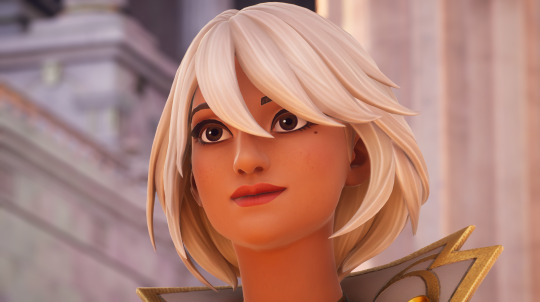
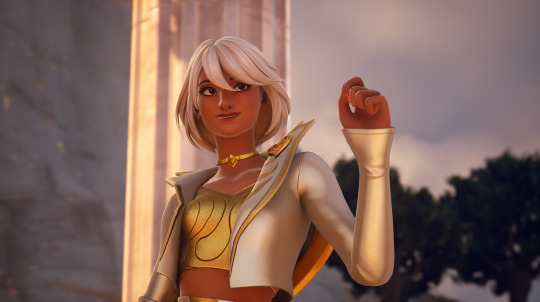
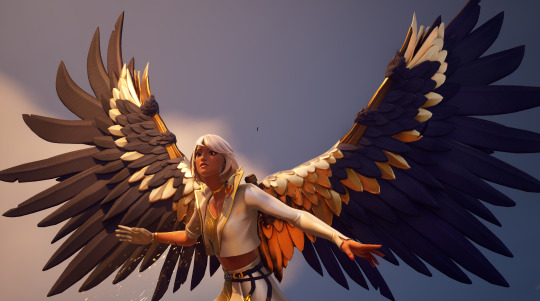

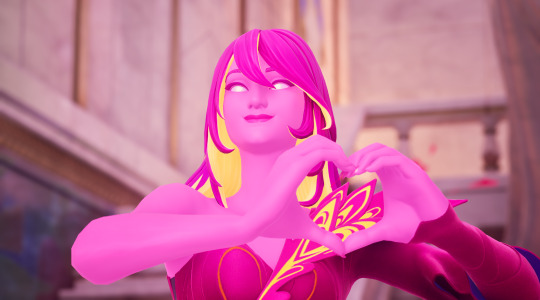
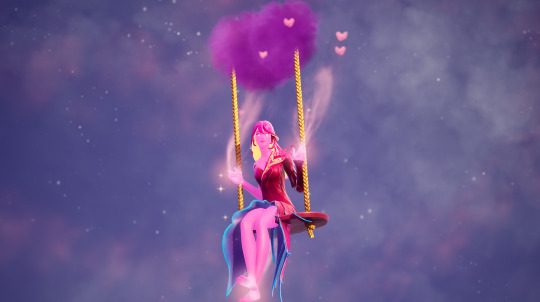
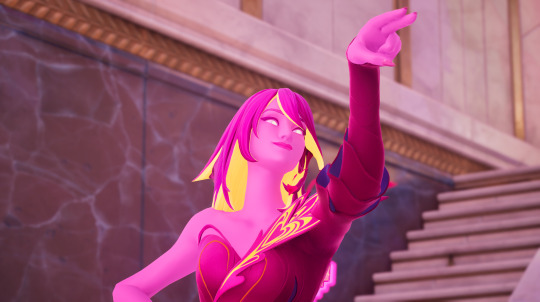
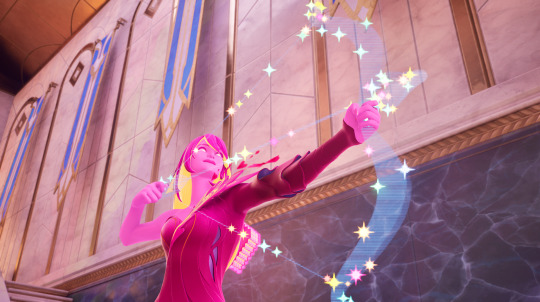
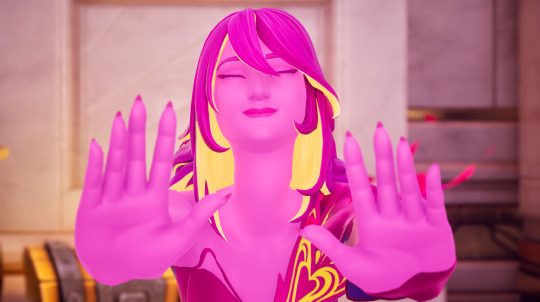
Love wins ❤️
#fortnite#fortography#fortnite skins#fortnite battle royale#virtual photography#fortnite photography#fortnite chapter 5#fortnite myths and mortals#fortnite myths & mortals#fortnite chapter 5 season 2#fortnite c5s2#greek mythology#aphrodite#fn aphrodite#aphrodite fn#fortnite aphrodite
30 notes
·
View notes